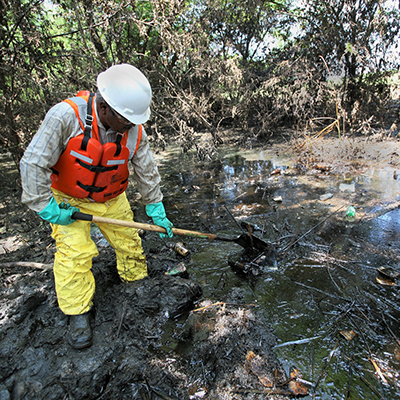
The thought of having a spill, release, overflow, or explosion at a facility is always in the back of our minds, but we never genuinely expect it to happen. Despite the best precautions, accidents happen, systems fail, and employees and facilities need to be prepared. Time is of the essence during the initial stage of a disaster, and the first 24 hours of the response can change the outcome of the project dramatically. Are your employees trained and are your facilities outfitted for when that disaster occurs?
Emergency response, spill response, and rapid response teams are critical pieces to be included in preparation for a potential spill or disaster. For oil and gas facilities, metal manufacturing facilities, and even food manufacturers, an unexpected spill or disaster could occur at any moment. Several regulatory agencies govern spills or discharges in Texas and across the United States. However, what they all have in common is that spills need to be properly reported, fully assessed, and remediated as soon as possible to reduce potential long-term environmental impacts and their associated liabilities.
Facilities that are prepared for the worst should be equipped with easily accessible spill response kits, properly trained and outfitted employees, and have performed desktop and live-action drills to mock a disaster situation. Those facilities should also pre-quality contractors they may rely on in emergencies to assist with response activities. Knowing you have properly trained staff, qualified and certified contractors, and proper equipment in place when a disaster may occur will alleviate stress and get you ahead of the curve. When it comes to spill preparation, do you know who to call, are your contractors set up with proper training and equipment, and do you have a plan in place?
Essential steps in spill response are knowing where and how the spill occurred, the material and quantity spilled, how to report, and what personnel and equipment are required to bring the spill under control. Investigating and identifying the extent of impacts, identifying remedial options all take time, but the more prepared you are, the more efficient you and your response contractors and consultants will be. As they say, hope for the best, but prepare for the worst.
Mitigating the risk for spills, releases, discharges, or overflows starts with process knowledge and preparedness. If we understand our facilities and operations, identify proper personnel for spill and rapid response teams, and develop and implement spill preparedness plans, we can reduce the risk for potential and unexpected spills and disasters.
Contact Our Environmental Consultants
Should you have questions regarding spill response and remediation, please click the link below to fill out our Contact Us form.